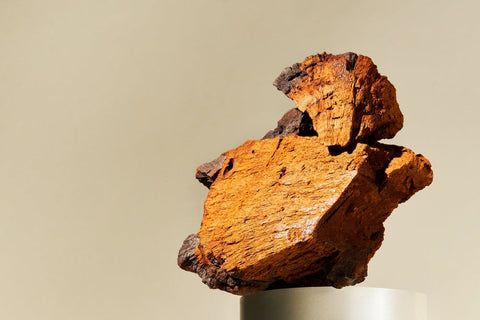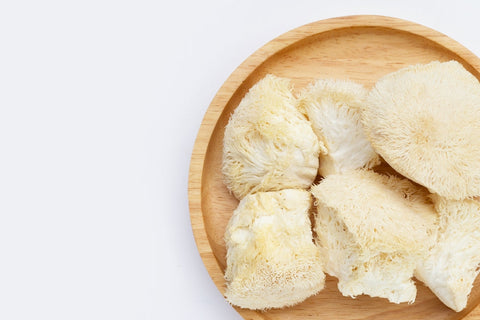Chaga mushrooms have long been steeped in the traditions of Russian and northern European medicine. Today, “The Health Benefits of Chaga” is a subject of growing excitement and scientific curiosity. From antioxidant power to possible anti-cancer activity, chaga (Inonotus obliquus) is making headlines in the world of health and wellness. But what does the latest research say—and what mysteries still await discovery? Let’s explore the story behind this intriguing mushroom.
Chaga Mushrooms: An Ancient Remedy Meets Modern Science
Chaga mushrooms grow wild on birch trees in cold climates—dark and unassuming on the outside, but bursting with wellness potential on the inside [1][3]. For centuries, people in Russia, Scandinavia, and other northern regions brewed chaga tea for stamina and healing. Today, scientists are taking a closer look at why this mushroom may be a powerhouse for health.
If you’re interested in the bigger picture of how functional mushrooms support well-being (including Lion’s Mane and Reishi), check out this overview: The Health Benefits of Mushrooms: A Quick Overview.
Let’s break down the key health benefits of chaga, according to research.
Rich in Antioxidants: The “Miracle” Molecules
One of the brightest stars in chaga’s nutritional profile is its ultra-high antioxidant content. Antioxidants are natural substances that help defend our cells against harmful molecules called free radicals. If unchecked, free radicals can damage cells, speed up aging, and trigger diseases like cancer, diabetes, and heart troubles [1][2][3][4].
Chaga is loaded with these cell-protecting compounds. Its antioxidant potential isn’t just “good”—it ranks among the highest in the mushroom kingdom [2][3].
Some scientists suggest regular chaga intake could lower your risk of chronic problems tied to oxidative stress, including certain cancers and heart diseases [2][3].
Anti-Inflammatory Effects: Calming the Storm Inside
Inflammation is the body’s way of fighting off infection and healing. But if it goes unchecked, it can lead to pain, gut troubles, and even autoimmune issues. Chaga mushrooms, it turns out, may be a natural way to “dial down” too much inflammation.
Recent studies show chaga has potent anti-inflammatory effects, especially in the digestive tract. Animal tests have revealed that chaga extracts can soothe inflamed tissue, even reducing damage in the gut [1][2][3][4]. Looking for digestive support from mushrooms? Read about how mushroom coffee can affect digestion: Does Mushroom Coffee Make You Poop?
These calming powers may one day help people with irritable bowel syndrome (IBS), Crohn’s disease, and possibly other autoimmune conditions [4].
Immune System Support: Power for Your Body’s Defenders
What if your immune system could get a little boost every day? Chaga mushrooms are rich in bioactive goodness—especially a fiber called beta-glucan—that seems to activate the body’s natural defenses [2][3][4][5].
Lab and animal studies suggest these compounds help “wake up” white blood cells, which are the immune system’s front-line soldiers. In theory, taking chaga could help your body fight off bacteria, viruses, and other threats more effectively [2][3][4][5]. Curious about how to get mushroom benefits in modern, tasty ways? See how mushroom coffee stacks up for immunity: Mushroom Coffee Benefits: A Brew of Health and Innovation.
Some people believe it may help shorten the length or lessen the severity of the common cold—but again, more human trials are needed to confirm these effects.
Potential Anti-Cancer Properties: Hope on the Horizon?
Perhaps the most promising area of chaga research is its potential in combating cancer. Early tests in laboratories and animals have delivered intriguing results: extracts from chaga can slow the growth—and, in some cases, shrink—the size of different types of tumors [1][3][4][5].
In studies with mice, those who were given chaga supplements showed a remarkable 60% reduction in tumor size [1][4]. To learn about another mushroom with potential brain-boosting and anti-cancer research, explore Lion's Mane here.
Researchers are also looking closely at two chaga compounds—triterpenes and inotodiol—that seem to make cancer cells self-destruct, while leaving healthy cells unharmed [3][4].
It’s important to highlight: none of these effects have been tested in large, controlled studies with people. Still, the excitement is real, and clinical trials may not be far behind.
Blood Sugar and Cholesterol Control: Heart and Body in Balance
Chaga’s benefits may also reach into the realm of heart health and metabolic wellness. Certain studies on mice and lab models show that chaga can lower blood sugar by as much as 31%, pointing to potential support for people with prediabetes, diabetes, or issues like polycystic ovary syndrome (PCOS) [1].
The mushroom’s active ingredients may also help reduce LDL (“bad”) cholesterol and lower triglycerides—both key risk factors for heart disease [1][2]. By helping to balance blood sugar and fats in the body, chaga might offer a double-whammy of cardiovascular support.
Other Promising Effects: Immunity, Mood, and Beyond
Researchers are still unraveling the full potential of chaga mushrooms. In addition to what’s already described, early studies hint at several more “bonus” benefits:
- Antiviral effects: Chaga may help the body resist or recover from viral infections [3].
- Antiplatelet action: The mushroom might influence how your blood clots, opening potential for use with heart health (with caution) [3].
- Anti-allergic abilities: Some tests find that chaga can help quiet allergy symptoms [3].
- Brain support: There’s emerging evidence that chaga could help with memory, focus, and even act as a mild pain reliever [3].
For a deep dive on mushrooms and cognitive function, including the world of nootropics, don’t miss this guide: Nootropics: The Science and Stories Behind Cognitive Enhancers.
These findings, although fascinating, are from early-stage research and primarily conducted in animals or laboratories, so more solid evidence in humans is needed.
What the Science Really Says: Promises and Pitfalls
It’s easy to get excited about the possibilities of chaga. But is the hype matched by human experience? Here’s what the consensus says:
- Most research is in animals or test tubes. Very few high-quality human trials have examined chaga’s effects, especially at supplement or “therapeutic” dosages [1][3][5].
- Safety and dosage guidelines are unclear. No official recommendations exist, especially for people with health conditions, children, or pregnant women [1][3].
- Dietary supplements aren’t regulated like medicines. The FDA hasn’t approved chaga for any specific treatment, and product quality can vary widely [3].
- Natural chaga is being overharvested. High demand is putting a strain on the mushrooms’ wild populations, especially in the northern forests. Sustainable chaga farming is now gaining traction to meet demand responsibly [3].
- Possible side effects exist. While no major issues have been reported, chaga may interact with blood-thinning or diabetes medications, and there’s a risk of allergic reactions or digestive upset. Always check with a healthcare provider before starting any new supplement.
Summary Table: What We Know So Far About Chaga
| Potential Benefit | Evidence Type | Human Evidence |
|---|---|---|
| Antioxidant effects | Animal/lab | Limited/Not conclusive |
| Immune system support | Animal/lab | Limited |
| Anti-inflammatory effects | Animal/lab | Limited |
| Anti-cancer effects | Animal/lab | Not established |
| Blood sugar control | Animal/lab | Limited |
| Cholesterol lowering | Animal/lab | Limited |
| Other effects | Animal/lab | Not established |
Should You Try Chaga?
With all this promise, should you rush to add chaga to your daily regimen? Here’s the bottom line:
- Chaga is NOT a cure-all, nor a substitute for medical treatment. If you have health conditions or take prescription medications, always talk to your doctor before starting chaga [1][3][5].
- Look for sustainably sourced, quality products. If you do try chaga supplements or powders, find brands that test for purity and transparency.
- Start low, go slow. No “ideal dose” has been established, so it’s wise to begin with a small amount.
- Watch for reactions. Stop using chaga if you experience side effects or anything unexpected.
Curious about the best way to take mushroom supplements or blend chaga into your daily routine? Find your best fit at Exploring Mushroom Supplements: Which is Best for You.
The Future of Chaga: Science and Sustainability
Excitement is building around chaga’s possible health benefits, but the science is still catching up. Researchers are now working to turn animal data into solid proof for human health [1][2][3][4][5].
Meanwhile, a new challenge is emerging: protecting wild chaga. As demand soars, forests are feeling the pressure. That’s why cultivated chaga is seen as the way forward, preserving the environment while delivering wellness to more people [3].
The Takeaway
Chaga mushrooms are an ancient remedy stepping boldly into the scientific spotlight. With potential benefits like antioxidant power, reducing inflammation, aiding immunity, and even fighting cancer in early research, chaga has certainly earned its “superfood” reputation.
But remember: much of the promise is still based on studies in animals and labs—not on large groups of people. The best approach? Stay curious, be critical, and always look for trustworthy sources—both in supplements and information.
If you want to compare chaga with other popular wellness mushrooms, including how they appear in coffee blends, check out our article: Mushroom Coffee Benefits: A Brew of Health and Innovation.
The next few years could bring major breakthroughs in chaga research, revealing even more about what this wild mushroom can do.
References
[1] https://health.
[2] https://www.ferwer.com/blog/
[3] https://www.mskcc.org/cancer-
[4] https://www.healthline.com/
[5] https://www.webmd.com/diet/


